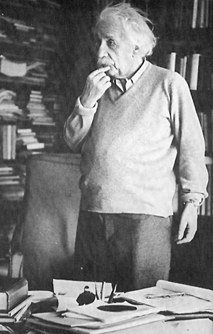Biography
Texts by Dr. Antonio Moreno González
Albert Einstein has aroused so much interest amongst scientists and laypeople alike that he is possibly the one individual about whose life people know most: what he did, where he went, who he talked to, his tastes, what he did in his spare time, etc. -- practically everything, indeed, that happened in his fruitful, intense and eventful life. Such is his fame that if one were to ask anyone for the name of a single scientist, it would undoubtedly be that of Einstein, and if one were to present them with a series of scientists' portraits, his would be the first to be identified.
He has been written about by very people from very diverse fields, sometimes with conflicting interests: he has been praised as a scientist, but he has also been accused of plagiarism and deceit; some have deified him as a pacifist and a defender of the defenceless, while others have decried him as "the father of the atom bomb"; he has been held up as a recluse in a world privileged by science, and reproached for his unfaithfulness and his lack of interest in his family.
This knowledge of his life, however, has not been paralleled by a knowledge of his work, as he always regretted, seeing himself "rather like King Midas, except that everything turns not into gold but into a circus". The solitude he preferred to keep; the incomprehension and harassment he had to put up with from hostile spheres of political, social and academic life; the blatant abuse of his name and his image to promote products or champion causes of all kinds did not succeed in driving him away from his most precious refuge: science. And he practiced that science in a very personal way, to some extent as an "outsider" from academic processes, renouncing even the usual methods of ascending the academic ladder.

In thought, habitual for Einstein
